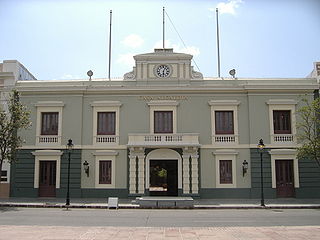
A municipality is usually a single administrative division having corporate status and powers of self-government or jurisdiction as granted by national and regional laws to which it is subordinate.

Local government is a generic term for the lowest tiers of public administration within a particular sovereign state. This particular usage of the word government refers specifically to a level of administration that is both geographically-localised and has limited powers. While in some countries, "government" is normally reserved purely for a national administration (government), the term local government is always used specifically in contrast to national government – as well as, in many cases, the activities of sub-national, first-level administrative divisions. Local governments generally act only within powers specifically delegated to them by law and/or directives of a higher level of government. In federal states, local government generally comprises a third or fourth tier of government, whereas in unitary states, local government usually occupies the second or third tier of government.

A town is a human settlement. Towns are generally larger than villages and smaller than cities, though the criteria to distinguish between them vary considerably in different parts of the world.

A metropolitan area or metro is a region consisting of a densely populated urban core and its less-populated surrounding territories under the same administrative jurisdiction, sharing industries, commercial areas, transport network, infrastructures and housing. A metro area usually comprises multiple jurisdictions and municipalities: neighborhoods, townships, boroughs, cities, towns, exurbs, suburbs, counties, districts, and even states and nations like the eurodistricts. As social, economic and political institutions have changed, metropolitan areas have become key economic and political regions.
In many countries, a mayor is the highest-ranking official in a municipal government such as that of a city or a town. Worldwide, there is a wide variance in local laws and customs regarding the powers and responsibilities of a mayor as well as the means by which a mayor is elected or otherwise mandated. Depending on the system chosen, a mayor may be the chief executive officer of the municipal government, may simply chair a multi-member governing body with little or no independent power, or may play a solely ceremonial role. A mayor's duties and responsibilities may be to appoint and oversee municipal managers and employees, provide basic governmental services to constituents, and execute the laws and ordinances passed by a municipal governing body. Options for selection of a mayor include direct election by the public, or selection by an elected governing council or board.

The municipalities of Brazil are administrative divisions of the Brazilian states. Brazil currently has 5,570 municipalities, which, given the 2019 population estimate of 210,147,125, makes an average municipality population of 37,728 inhabitants. The average state in Brazil has 214 municipalities. Roraima is the least subdivided state, with 15 municipalities, while Minas Gerais is the most subdivided state, with 853.

An unincorporated area is a region not governed by a local municipal corporation. Similarly, an unincorporated community is a settlement not governed by its own local municipal corporation, but is administered as part of larger administrative divisions, such as a township, parish, borough, county, city, canton, state, province, or country. Occasionally, municipalities dissolve or disincorporate, which may happen if they become fiscally insolvent, and services become the responsibility of a higher administration. Widespread unincorporated communities and areas are a distinguishing feature of the United States and Canada. Most other countries of the world have either no unincorporated areas at all, or these are very rare; typically remote, outlying, sparsely populated, or uninhabited areas.

A municipality is a local government unit (LGU) in the Philippines. A municipality is called town in its archaic term: a municipality has the function of a town since its inception. It is distinct from city, which is a different category of local government unit. Provinces of the Philippines are divided into cities and municipalities, which in turn, are divided into barangays – villages. As of 7 September 2019, there are 1,488 municipalities across the country.

Halifax, formally known as the Halifax Regional Municipality (HRM), is the capital and largest municipality of the Canadian province of Nova Scotia. It had a population of 403,131 in 2016, with 316,701 in the urban area centred on Halifax Harbour. As of July 2020, Statistics Canada estimated the population of the CMA at 448,544. The regional municipality consists of four former municipalities that were amalgamated in 1996: Halifax, Dartmouth, Bedford, and Halifax County.

The municipality is the basic local administrative division in Spain together with the province.

Neitersen is a municipality in the district of Altenkirchen, in Rhineland-Palatinate, in western Germany.

Lars Leese is a German former professional footballer who played as a goalkeeper. He is currently the manager of DSK Köln.
Nana Eshun is a Ghanaian footballer who plays for Asyut Petroleum of the Egyptian Premier League, as a striker.

Altenkirchener SG is a German football club from the city of Altenkirchen, Rhineland-Palatinate. The club was founded in 1909 as Sportverein Altenkirchen and in 1919 joined the gymnastics club Turnverein 1883 Altenkirchen which had established its own football department on 5 July 1883.
Sebastian Barnes is a Ghanaian former footballer who played at both professional and international levels as a midfielder.

The Wied-Scala is an art-house cinema in Neitersen in the Westerwald region of Germany. It was first opened as a normal cinema in 1956. It takes its name from the river Wied, which flows immediately by the cinema building. The foyer of the cinema has a small café, which is supplemented in summer by a beer garden. The arena and balcony offer 110 seats. For events without seating, it can accommodate about 220 people. Since its reopening in 1988, the Wied Scala has established itself as a venue for culture and events covering for a wide variety of themes and, since 1989, it has been regularly received awards for an outstanding film programme at state and federal level. In recent years comprehensive modernisation measures have been carried out to upgrade the video and sound technology, as well as seating and fire protection, in order to cope with the rising demands on infrastructure and safety. In spite of these measures the cinema very largely retains its 1950's décor and original character.
Altenkirchen-Flammersfeld is a Verbandsgemeinde in the district of Altenkirchen, Rhineland-Palatinate, Germany. The seat of the Verbandsgemeinde is in Altenkirchen. It was formed on 1 January 2020 by the merger of the former Verbandsgemeinden Altenkirchen and Flammersfeld.
















